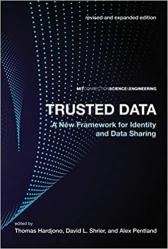 Название: Trusted Data, revised and expanded edition: A New Framework for Identity and Data Sharing
Название: Trusted Data, revised and expanded edition: A New Framework for Identity and Data SharingАвтор: Thomas Hardjono, David L. Shrier
Издательство: MIT Connection Science & Engineering
Год: 2019
Страниц: 386
Язык: английский
Формат: pdf (true)
Размер: 10.1 MB
How to create an Internet of Trusted Data in which insights from data can be extracted without collecting, holding, or revealing the underlying data.
Trusted Data describes a data architecture that places humans and their societal values at the center of the discussion. By involving people from all parts of the ecosystem of information, this new approach allows us to realize the benefits of data-driven algorithmic decision making while minimizing the risks and unintended consequences. It proposes a software architecture and legal framework for an Internet of Trusted Data that provides safe, secure access for everyone and protects against bias, unfairness, and other unintended effects. This approach addresses issues of data privacy, security, ownership, and trust by allowing insights to be extracted from data held by different people, companies, or governments without collecting, holding, or revealing the underlying data. The software architecture, called Open Algorithms, or OPAL, sends algorithms to databases rather than copying or sharing data. The data is protected by existing firewalls; only encrypted results are shared. Data never leaves its repository. A higher security architecture, ENIGMA, built on OPAL, is fully encrypted.
Building on OPAL, ENIGMA is a decentralized platform that at its core uses a blockchain protocol to enable secure data sharing such that it removes the need for a trusted third party and enables the autonomous control of personal data. Given the properties of blockchain, ENIGMA users are able to share and sell their personal data with cryptographic guarantees regarding their privacy.
ENIGMA itself is comprised of a network of computers that store and execute queries. Using secure multi- party computation (sMPC or MPC), each computer only sees random pieces of the data, a fact that prevents information leaks. Furthermore, queries carry a micropayment for the computing resources, as well as a micropayment to those users whose data is queried, thus providing the foundation for the rise of a data market.
The ENIGMA system offers owners not only full control of the personal data but also transparency as to which services are accessing their data and for what purposes. Service providers would be able to monetize the personal data available in the system without ever having access to the raw data. Finally, thanks to ENIGMA’s blockchain technology, all transactions would take place while preserving privacy and data integrity.
Скачать Trusted Data, revised and expanded edition: A New Framework for Identity and Data Sharing